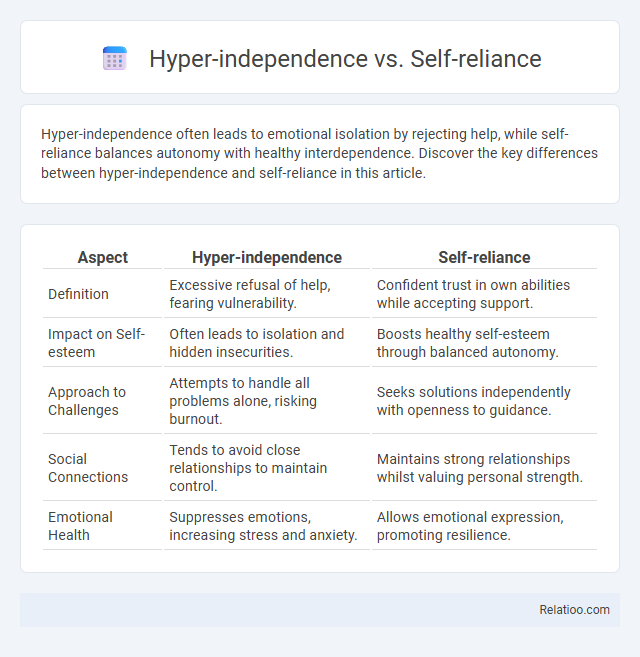Hyper-independence often leads to emotional isolation by rejecting help, while self-reliance balances autonomy with healthy interdependence. Discover the key differences between hyper-independence and self-reliance in this article.
Table of Comparison
| Aspect | Hyper-independence | Self-reliance |
|---|---|---|
| Definition | Excessive refusal of help, fearing vulnerability. | Confident trust in own abilities while accepting support. |
| Impact on Self-esteem | Often leads to isolation and hidden insecurities. | Boosts healthy self-esteem through balanced autonomy. |
| Approach to Challenges | Attempts to handle all problems alone, risking burnout. | Seeks solutions independently with openness to guidance. |
| Social Connections | Tends to avoid close relationships to maintain control. | Maintains strong relationships whilst valuing personal strength. |
| Emotional Health | Suppresses emotions, increasing stress and anxiety. | Allows emotional expression, promoting resilience. |
Understanding Hyper-independence and Self-reliance
Hyper-independence involves an excessive need to handle everything alone, often avoiding help even when necessary, whereas self-reliance reflects a healthy balance of confidence in one's abilities while recognizing when to seek support. Understanding hyper-independence requires identifying its roots in fear of vulnerability or control issues, contrasting with self-reliance's foundation in trust and resilience. mastering this distinction empowers you to build stronger relationships and maintain emotional well-being while fostering genuine independence.
Key Differences Between Hyper-independence and Self-reliance
Hyper-independence involves an excessive need to handle everything alone, often avoiding help even when necessary, whereas self-reliance is a balanced confidence in one's abilities combined with the wisdom to seek support when appropriate. Your self-reliance fosters resilience and adaptability by recognizing personal limits, while hyper-independence can lead to isolation and burnout due to unrealistic expectations of self-sufficiency. Understanding these distinctions helps you maintain healthy boundaries and effective problem-solving strategies.
Psychological Roots of Hyper-independence
Hyper-independence stems from deep psychological roots such as fear of vulnerability, past trauma, or experiences of neglect, leading individuals to excessively prioritize control and self-sufficiency over seeking help. Unlike healthy self-reliance, which balances autonomy and collaboration, hyper-independence can result in isolation and emotional exhaustion. Understanding these roots can help you recognize when your drive for independence might mask underlying emotional needs.
The Benefits of Healthy Self-reliance
Healthy self-reliance empowers you to confidently manage challenges while maintaining strong social connections, unlike hyper-independence which often leads to isolation. It fosters resilience and adaptability by encouraging personal responsibility without rejecting support from others. Embracing self-reliance enhances emotional well-being and promotes balanced decision-making in both personal and professional life.
Warning Signs of Hyper-independence
Hyper-independence manifests through an excessive refusal to accept help or collaborate, often leading to isolation and strained relationships. Warning signs include persistent belief that asking for assistance is a weakness, reluctance to delegate tasks even when overwhelmed, and dismissing others' support or advice. This contrasts with healthy self-reliance, which balances autonomy with openness to cooperation and resource-sharing.
Impact on Relationships: Hyper-independence vs Self-reliance
Hyper-independence often leads to emotional distance and difficulty forming deep connections, as individuals may avoid vulnerability and rely solely on themselves. Self-reliance promotes healthy boundaries and autonomy while maintaining openness to support, fostering trust and stronger relationships. The impact on relationships is significant, with self-reliance encouraging balance and collaboration, whereas hyper-independence can result in isolation and misunderstandings.
Societal Influences Shaping Independence
Societal influences significantly shape the development of independence, where hyper-independence often stems from cultural norms valuing extreme self-sufficiency and emotional detachment, while self-reliance promotes balanced autonomy and confidence in personal abilities. Your environment, including family dynamics and community support systems, plays a crucial role in fostering healthy independence by encouraging resourcefulness without isolation. Understanding these societal factors helps distinguish between empowering self-reliance and the potentially detrimental effects of hyper-independence.
How Trauma Fuels Hyper-independence
Trauma often fuels hyper-independence by instilling deep-seated fears of vulnerability and reliance on others, causing individuals to excessively prioritize self-sufficiency beyond healthy self-reliance. Unlike balanced self-reliance, which fosters confidence and adaptability, hyper-independence manifests as a defensive mechanism to avoid perceived risks of abandonment or harm. Your awareness of this dynamic can help in recognizing and addressing how trauma shapes dependence patterns for improved emotional resilience.
Cultivating Balanced Self-reliance
Cultivating balanced self-reliance involves recognizing the fine line between healthy independence and hyper-independence, where excessive self-sufficiency can lead to isolation and burnout. You can build resilience by trusting your abilities while also seeking support when needed, fostering a sustainable approach to personal and professional growth. Embracing interdependence enhances emotional well-being and strengthens relationships without compromising your autonomy.
Overcoming the Pitfalls of Hyper-independence
Overcoming the pitfalls of hyper-independence involves recognizing the balance between extreme self-sufficiency and healthy self-reliance, which fosters resilience without isolating oneself. Emphasizing interdependence, seeking support, and cultivating trust in others mitigate the dangers of hyper-independence such as burnout, emotional detachment, and strained relationships. Developing this equilibrium enhances personal growth and sustainable success by integrating autonomy with collaborative strength.

Infographic: Hyper-independence vs Self-reliance
 relatioo.com
relatioo.com